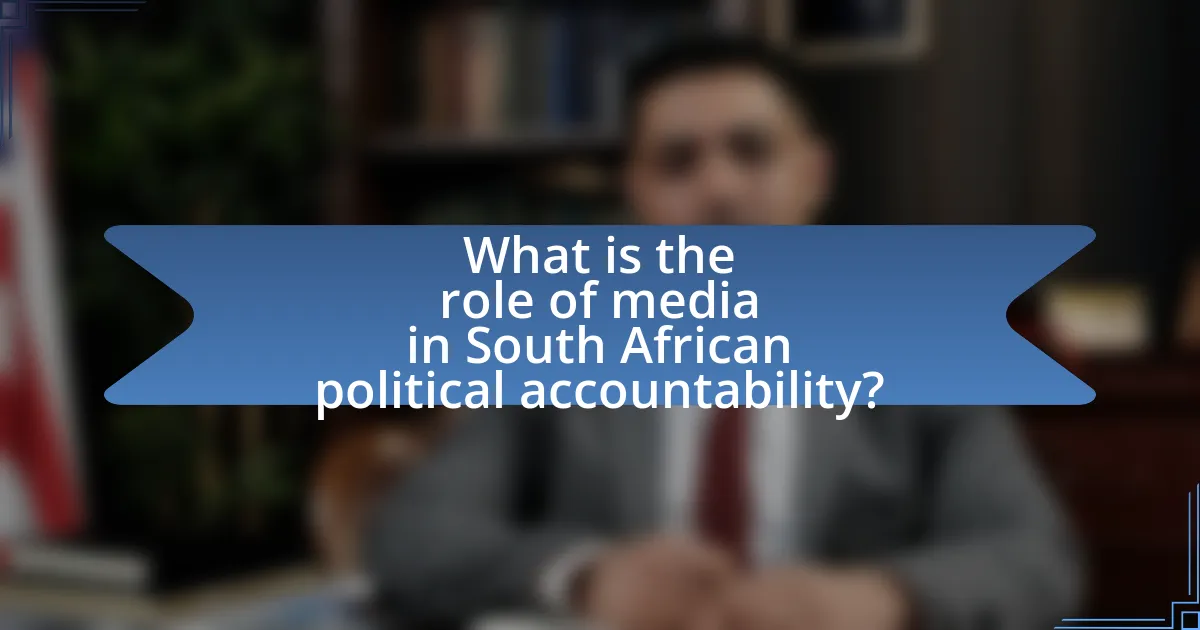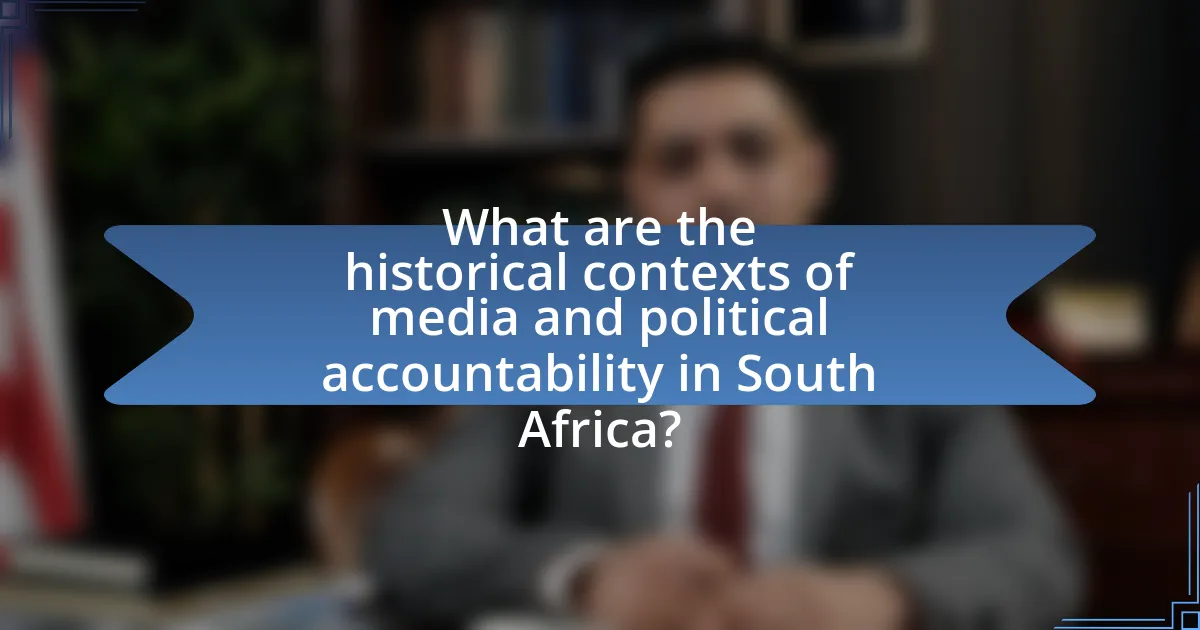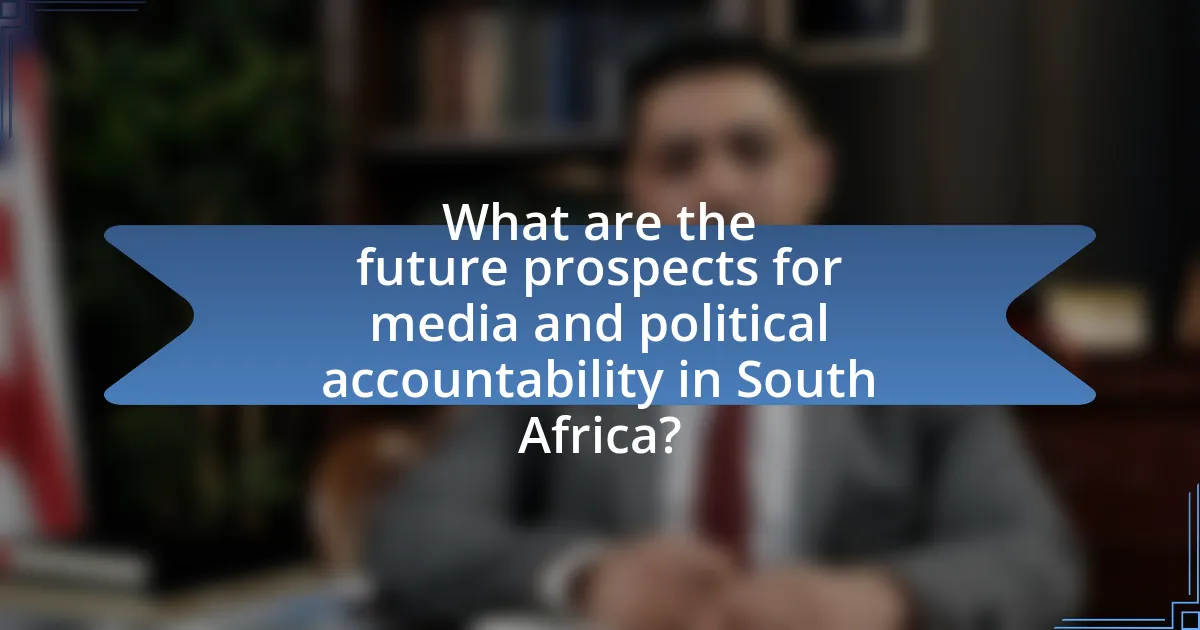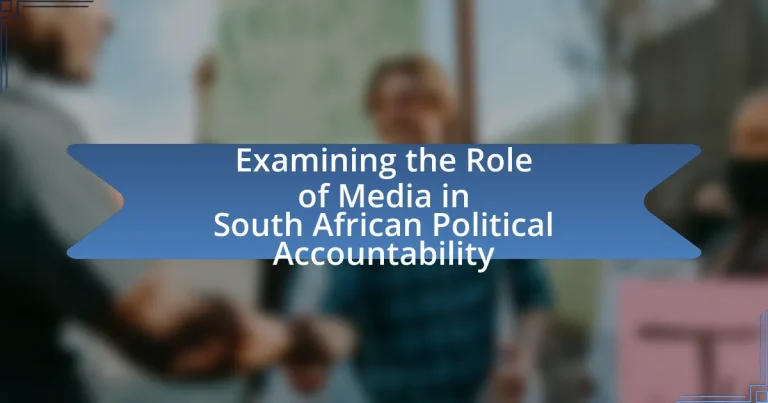The article examines the critical role of media in promoting political accountability in South Africa. It highlights how the media acts as a watchdog, exposing corruption and facilitating public discourse, thereby enabling citizens to hold government officials accountable. Key functions of the media, including investigative journalism and the impact of social media, are discussed, along with the challenges faced, such as censorship and misinformation. The article also explores the historical context of media practices in South Africa, the evolution of media since the end of apartheid, and the future prospects for media accountability in the political landscape.

What is the role of media in South African political accountability?
The media plays a crucial role in South African political accountability by acting as a watchdog that monitors government actions and informs the public. This function is vital for fostering transparency and enabling citizens to hold their leaders accountable. For instance, investigative journalism has uncovered corruption scandals, such as the Gupta family’s influence over state affairs, which led to significant political repercussions and public outcry. Furthermore, the media facilitates public discourse by providing a platform for diverse opinions, thereby enhancing democratic engagement and ensuring that government officials are answerable to the electorate.
How does media influence political accountability in South Africa?
Media influences political accountability in South Africa by serving as a watchdog that exposes corruption and holds public officials accountable. Investigative journalism, particularly through platforms like the Mail & Guardian and News24, has uncovered numerous scandals, such as the Gupta family’s influence on state affairs, which led to public outcry and political consequences. Furthermore, social media has amplified citizen engagement, allowing for real-time reporting and mobilization against government actions, as seen during the #FeesMustFall movement. This dynamic creates pressure on politicians to act transparently and responsibly, reinforcing the role of media as a critical component of democratic governance in South Africa.
What are the key functions of media in promoting accountability?
The key functions of media in promoting accountability include informing the public, acting as a watchdog, and facilitating public discourse. Media informs citizens about government actions, policies, and issues, enabling them to make informed decisions. As a watchdog, media investigates and exposes corruption, misconduct, and abuse of power, holding public officials accountable for their actions. Furthermore, media facilitates public discourse by providing a platform for debate and discussion, encouraging civic engagement and participation in the democratic process. These functions are essential for fostering transparency and ensuring that government entities remain answerable to the public.
How does media coverage affect public perception of political leaders?
Media coverage significantly shapes public perception of political leaders by influencing how their actions and policies are interpreted. For instance, positive media portrayals can enhance a leader’s image, leading to increased public support, while negative coverage can damage reputations and decrease approval ratings. Research conducted by the Pew Research Center indicates that 62% of Americans believe news coverage influences their opinions about political figures. Furthermore, in South Africa, studies have shown that media narratives can sway public sentiment, particularly during election cycles, highlighting the critical role of media in shaping political accountability and public trust.
Why is media considered a watchdog in South African politics?
Media is considered a watchdog in South African politics because it plays a crucial role in holding government officials accountable and exposing corruption. The South African media landscape, characterized by a diverse range of outlets, actively investigates and reports on political misconduct, thereby informing the public and fostering transparency. For instance, the exposure of the Gupta family’s influence over former President Jacob Zuma’s administration highlighted the media’s effectiveness in uncovering state capture, which led to significant political repercussions. This watchdog function is essential for maintaining democratic integrity and ensuring that citizens are aware of governmental actions and policies.
What mechanisms do media use to hold politicians accountable?
Media use several mechanisms to hold politicians accountable, including investigative journalism, fact-checking, public opinion polling, and the dissemination of information through various platforms. Investigative journalism uncovers corruption and misconduct, as seen in the work of South African outlets like the Mail & Guardian, which has exposed numerous political scandals. Fact-checking organizations, such as Africa Check, verify statements made by politicians, ensuring that the public is informed about inaccuracies. Public opinion polling gauges citizens’ perceptions of political actions, influencing accountability by reflecting voter sentiment. Additionally, media platforms provide a space for public discourse, allowing citizens to voice concerns and demand accountability from their elected officials. These mechanisms collectively contribute to a more informed electorate and promote transparency in governance.
How effective are these mechanisms in practice?
The mechanisms of media in South African political accountability are effective in practice, as evidenced by their role in exposing corruption and holding public officials accountable. For instance, investigative journalism has led to significant political consequences, such as the exposure of state capture involving high-ranking officials, which resulted in public outcry and subsequent legal actions. Reports from the Media Monitoring Africa organization indicate that media coverage of political issues has increased public awareness and engagement, thereby enhancing accountability. Additionally, the South African Press Council has mechanisms in place to address complaints against media outlets, further reinforcing the media’s role in promoting transparency and accountability in governance.
What challenges does media face in ensuring political accountability?
Media faces significant challenges in ensuring political accountability, primarily due to issues such as censorship, misinformation, and limited access to information. Censorship, often imposed by government entities, restricts journalists’ ability to report freely on political matters, undermining transparency. Misinformation, exacerbated by social media platforms, complicates the public’s understanding of political issues, making it difficult for the media to provide accurate reporting. Additionally, limited access to information, particularly in regions where government officials are uncooperative, hinders investigative journalism efforts. These challenges collectively impede the media’s role in holding political figures accountable, as evidenced by instances in South Africa where journalists have faced threats and violence for exposing corruption.
How do censorship and government control impact media freedom?
Censorship and government control significantly restrict media freedom by limiting the ability of journalists to report independently and truthfully. In South Africa, laws such as the Protection of State Information Bill have been criticized for enabling government censorship, which undermines the media’s role in holding power accountable. According to the 2023 World Press Freedom Index, South Africa ranks 32nd out of 180 countries, indicating challenges in media freedom due to government interference and threats against journalists. This environment stifles critical reporting, reduces public access to information, and ultimately weakens democratic accountability.
What role does media ownership play in political reporting?
Media ownership significantly influences political reporting by shaping the narratives and perspectives presented to the public. Ownership structures can determine editorial policies, leading to biased reporting that aligns with the interests of owners or shareholders. For instance, in South Africa, major media conglomerates often have political affiliations or economic interests that can affect their coverage of political events, potentially prioritizing certain viewpoints over others. Research indicates that concentrated media ownership can limit diversity in political discourse, as seen in studies highlighting how ownership ties can lead to the underreporting of issues critical to political accountability.
How does the public engage with media regarding political accountability?
The public engages with media regarding political accountability primarily through active consumption and interaction with news content. This engagement includes reading articles, watching news broadcasts, and participating in discussions on social media platforms, which allows citizens to stay informed about political actions and hold leaders accountable. For instance, a study by the Media Monitoring Africa organization found that increased media consumption correlates with heightened public awareness of political issues in South Africa, leading to greater civic participation and demands for transparency from elected officials.
What are the implications of social media on political accountability in South Africa?
Social media significantly enhances political accountability in South Africa by facilitating real-time communication and public engagement. Platforms like Twitter and Facebook allow citizens to voice concerns, mobilize protests, and hold politicians accountable for their actions. For instance, the #FeesMustFall movement utilized social media to organize protests against tuition increases, demonstrating how online platforms can amplify public dissent and demand governmental transparency. Additionally, social media serves as a tool for investigative journalism, enabling the rapid dissemination of information regarding political corruption, as seen in the exposure of the Gupta family’s influence over state affairs. This increased scrutiny fosters a culture of accountability, compelling politicians to respond to public sentiment and demands for ethical governance.
How has social media changed the landscape of political reporting?
Social media has transformed political reporting by enabling real-time dissemination of information and facilitating direct communication between politicians and the public. This shift allows for immediate coverage of political events, often bypassing traditional media gatekeepers, which can lead to a more dynamic and participatory political discourse. For instance, during the 2016 South African municipal elections, social media platforms were extensively used to mobilize voters and share information, demonstrating their influence on political engagement and accountability. Additionally, the rise of citizen journalism through social media has increased the volume of political content available, allowing diverse perspectives to emerge, which can enhance transparency and hold political figures accountable.
What are the risks associated with social media in political discourse?
The risks associated with social media in political discourse include the spread of misinformation, polarization of opinions, and the potential for manipulation by malicious actors. Misinformation can rapidly circulate on platforms, leading to misinformed public opinions and decisions, as evidenced by the 2016 U.S. presidential election where false information significantly influenced voter perceptions. Polarization occurs as algorithms often promote content that aligns with users’ existing beliefs, creating echo chambers that hinder constructive dialogue. Additionally, malicious actors can exploit social media to manipulate narratives, as seen in various instances of foreign interference in elections, which undermines democratic processes.

What are the historical contexts of media and political accountability in South Africa?
The historical contexts of media and political accountability in South Africa are rooted in the country’s struggle against apartheid and the subsequent transition to democracy. During apartheid, the media was heavily censored, limiting its ability to hold the government accountable; however, underground and alternative media emerged, playing a crucial role in exposing injustices and mobilizing resistance. Following the end of apartheid in 1994, the new democratic government established a more open media environment, enshrined in the Constitution, which guarantees freedom of expression and access to information. This shift allowed for greater scrutiny of political leaders and institutions, exemplified by the establishment of the South African Broadcasting Corporation’s public mandate and the growth of independent news outlets. The media’s role in political accountability has been further highlighted by significant events, such as the coverage of corruption scandals involving high-ranking officials, which have underscored the media’s function as a watchdog in a democratic society.
How has the role of media evolved since the end of apartheid?
Since the end of apartheid, the role of media in South Africa has evolved from a tool of state propaganda to a platform for diverse voices and democratic engagement. Initially, media was heavily censored and controlled by the apartheid government, limiting freedom of expression. Post-apartheid, the media landscape expanded significantly, with the establishment of independent newspapers, radio stations, and television channels, fostering a pluralistic environment. The South African Constitution, adopted in 1996, guarantees freedom of the press, further empowering media to hold the government accountable. This evolution is evidenced by the rise of investigative journalism and the media’s role in exposing corruption, such as the coverage of the Gupta scandal, which highlighted the influence of private interests on public policy.
What significant events have shaped media’s role in political accountability?
Significant events that have shaped media’s role in political accountability include the establishment of the South African Constitution in 1996, which enshrined freedom of expression and the press, allowing media to operate independently. The Truth and Reconciliation Commission (TRC) hearings from 1996 to 1998 highlighted the media’s role in exposing human rights abuses, fostering transparency and accountability. Additionally, the coverage of the Marikana massacre in 2012 underscored the media’s function in holding power to account by revealing state violence against miners. These events collectively reinforced the media’s critical position in promoting political accountability in South Africa.
How did the transition to democracy affect media practices?
The transition to democracy significantly transformed media practices in South Africa by promoting greater freedom of expression and reducing state control over media outlets. This shift allowed for a more diverse range of voices and perspectives to emerge, fostering investigative journalism and critical reporting on government actions. For instance, the establishment of the South African Broadcasting Corporation as a public broadcaster in 1994 aimed to serve the public interest and reflect the country’s multicultural society. Additionally, the Media Development and Diversity Agency was created to support community media and ensure a plurality of viewpoints, enhancing democratic discourse. These changes collectively contributed to a more accountable political environment, as media became a vital tool for holding power to account.
What lessons can be learned from past media practices in South Africa?
Past media practices in South Africa highlight the importance of media independence and accountability in fostering democratic governance. The apartheid era demonstrated how state-controlled media can suppress dissent and manipulate public perception, leading to a lack of transparency and accountability in political processes. For instance, the South African Broadcasting Corporation (SABC) was used as a tool for propaganda, which limited the public’s access to diverse viewpoints and critical information. This historical context underscores the necessity for a free press that can investigate and report on government actions without fear of censorship. Furthermore, the transition to democracy in the 1990s revealed that a vibrant media landscape is crucial for holding political leaders accountable, as seen in the role of investigative journalism in exposing corruption and human rights abuses. Thus, the lessons learned emphasize that media freedom is essential for political accountability and the protection of democratic values in South Africa.
What historical case studies illustrate media’s impact on political accountability?
Historical case studies that illustrate media’s impact on political accountability include the coverage of the Watergate scandal in the United States and the role of investigative journalism during the apartheid era in South Africa. The Watergate scandal, exposed by journalists Bob Woodward and Carl Bernstein, led to President Richard Nixon’s resignation in 1974, demonstrating how media scrutiny can hold political leaders accountable for misconduct. In South Africa, the reporting by publications like the Weekly Mail and journalists such as Anton Harber played a crucial role in exposing human rights abuses and government corruption during apartheid, contributing to the eventual dismantling of the regime and the establishment of a democratic government. These examples highlight the significant influence of media in promoting transparency and accountability in political systems.
How can these lessons inform current media practices?
Lessons from the examination of media’s role in South African political accountability can inform current media practices by emphasizing the importance of investigative journalism and transparency. Investigative journalism has historically played a crucial role in uncovering corruption and holding political figures accountable, as seen in the reporting on the Gupta family’s influence on South African politics. This highlights that current media practices should prioritize thorough investigations and fact-checking to ensure accurate reporting. Furthermore, fostering a culture of transparency within media organizations can enhance public trust, as evidenced by the positive reception of media outlets that openly disclose their funding sources and editorial processes. By adopting these lessons, media can better serve the public interest and contribute to a more accountable political environment.

What are the future prospects for media and political accountability in South Africa?
The future prospects for media and political accountability in South Africa appear to be cautiously optimistic, driven by a resilient civil society and increasing digital engagement. The South African media landscape has shown adaptability, with investigative journalism gaining traction, as evidenced by the rise of platforms like amaBhungane and the Daily Maverick, which focus on uncovering corruption and holding political figures accountable. Additionally, the South African Constitution guarantees freedom of expression, which supports media independence and fosters an environment where accountability can thrive. However, challenges such as political interference, threats to journalists, and issues of misinformation remain significant hurdles that could impact the effectiveness of media in promoting accountability.
How can media adapt to new technologies to enhance accountability?
Media can adapt to new technologies to enhance accountability by utilizing digital platforms for real-time reporting and audience engagement. By leveraging social media, news organizations can disseminate information quickly, allowing for immediate public scrutiny of political actions. For instance, platforms like Twitter and Facebook enable journalists to share updates and gather feedback, fostering a two-way communication channel that holds politicians accountable. Additionally, the use of data journalism tools allows media to analyze and present complex information in an accessible format, making it easier for the public to understand governmental processes and decisions. Research indicates that increased transparency through digital means correlates with higher levels of public trust in media, as seen in studies conducted by the Reuters Institute for the Study of Journalism, which highlight the effectiveness of digital engagement in enhancing accountability.
What innovations are emerging in media reporting on politics?
Innovations emerging in media reporting on politics include the use of data journalism, interactive storytelling, and real-time fact-checking. Data journalism allows reporters to analyze large datasets to uncover trends and insights, enhancing the depth of political reporting. Interactive storytelling engages audiences through multimedia elements, making complex political issues more accessible and understandable. Real-time fact-checking, facilitated by technology, enables journalists to verify claims made by politicians instantly, promoting accountability and transparency in political discourse. These innovations are reshaping how political information is disseminated and consumed, fostering a more informed public.
How can media leverage digital platforms for greater impact?
Media can leverage digital platforms for greater impact by utilizing social media, online news outlets, and multimedia content to enhance engagement and reach wider audiences. By actively engaging with audiences on platforms like Twitter and Facebook, media organizations can facilitate real-time discussions and feedback, which fosters a more interactive relationship with the public. Additionally, the use of video content and infographics on platforms such as YouTube and Instagram can simplify complex political issues, making them more accessible and shareable. Research indicates that digital platforms significantly increase the dissemination of information; for instance, a study by the Pew Research Center found that 62% of Americans get news from social media, highlighting the potential for media to influence public opinion and political accountability through these channels.
What role do citizens play in supporting media accountability?
Citizens play a crucial role in supporting media accountability by actively engaging in the consumption and critique of news content. Their involvement includes holding media organizations accountable through feedback, advocacy for transparency, and participation in public discourse. For instance, citizens can report inaccuracies, demand corrections, and support independent journalism, which fosters a more informed public. Research indicates that when citizens are vigilant and proactive, it leads to higher standards in journalism, as seen in South Africa where public pressure has prompted media outlets to address issues of bias and misinformation.
How can public engagement with media improve political accountability?
Public engagement with media can improve political accountability by fostering transparency and enabling citizen oversight of government actions. When the public actively engages with media, they can scrutinize political decisions, demand explanations, and hold officials accountable for their actions. For instance, studies have shown that increased media coverage of political issues correlates with higher levels of public awareness and civic participation, which in turn pressures politicians to act responsibly. In South Africa, the role of media in exposing corruption and facilitating public discourse has been critical, as evidenced by the reporting on the Gupta scandal, which mobilized public outrage and led to significant political consequences.
What strategies can citizens employ to hold media accountable?
Citizens can hold media accountable by actively engaging in fact-checking and promoting media literacy. By verifying information through reputable sources, citizens can challenge misinformation and demand corrections from media outlets. For instance, organizations like Africa Check provide resources for fact-checking claims made in the media, empowering citizens to scrutinize reporting. Additionally, citizens can utilize social media platforms to voice concerns about biased or inaccurate reporting, thereby increasing public awareness and pressure on media organizations to adhere to ethical standards. This engagement fosters a culture of accountability and encourages media to prioritize accuracy and fairness in their reporting.
What best practices can enhance the role of media in political accountability?
Best practices that can enhance the role of media in political accountability include promoting investigative journalism, ensuring transparency in reporting, and fostering collaboration between media organizations and civil society. Investigative journalism uncovers corruption and holds public officials accountable, as evidenced by the exposure of state capture in South Africa by the investigative unit of the Mail & Guardian. Transparency in reporting, such as disclosing sources and methodologies, builds trust with the audience and encourages public engagement. Collaboration between media and civil society organizations, like the partnership between the South African National Editors’ Forum and various NGOs, amplifies the reach and impact of accountability efforts, ensuring that diverse voices are heard and that the media serves as a watchdog for democracy.


